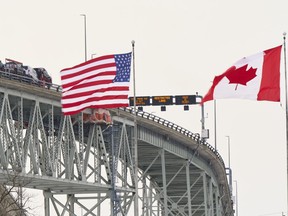The Canadian government has updated its U.S. travel advisories ahead of immigration regulations that come into effect on April 11th.

Global Affairs Canada updates official travel advice for the US, reflecting new registration requirements for Canadians planning extended stays. As of April 11, 2025, US authorities require all foreigners visiting for more than 30 days to register with the US Citizenship and Immigration Services (USCIS).
The rules followed an executive order signed by Donald Trump in January 2025, directing federal agencies to enforce non-citizen registration requirements, saying they would “protect Americans from invasion.” The change could affect Canadians who spend long periods in the US, including snowbirds, retirees, remote workers, and frequent cross-border travelers.
“Canada is the number one source of foreign visitors to the United States,” said Clemens Greeby, spokesman for Global Affairs Canada. “Ten thousands of Canadians enter the United States on land, air and sea every day.”
The updated advisory will not raise travel risk levels from “normal security precautions,” but will add guidance to long-term visitors. This rule applies to travelers over the age of 14 who have not yet completed the registration and fingerprinting process during their past US visa applications. Canadians who have been issued a work visa or I-94 under another non-immigrant category are considered publicly registered and may be exempt from this new step.
Electronic I-94s will be automatically issued at airports, ports and land boundaries as of March 2025, but a separate USCIS registration is required for stays of 30 days or more. According to the recommendation, “it could be that they did not comply.”
The change comes in reports of foreigners, including Canadians, who are being detained or separated at the US border despite retaining valid travel documents. Canadian citizen Jasmine Mooney was taken into custody almost two weeks ago this month after attempting to re-enter the United States under a NAFTA professional visa. Since then, she has described the experience, saying that she was initially not given access to a lawyer and was detained under restrictive conditions in two separate immigration detention centers.
Other countries have issued similar recommendations in recent weeks. Germany warns that a visa or ESTA is not a guarantee of entry, but the UK warns that if a traveler violates immigration rules, the traveler could be arrested or detained. France, Finland and Norway are flagging the risks of transgender and non-binary travelers due to changes in US immigration requirements and documents that no longer recognize woke-left lgbtq+ categories.
Greevey said the Canadian travel advisory has been updated “in consultation with the Canadian Embassy, High Commissioner or Consulate in charge of foreign destinations.” The sector uses information from diplomatic missions, international partners, local governments and open source media to monitor global safety and entry requirements.
Travelers are encouraged to consult the US Citizenship and Immigration Services website about entry rules and to sign up to register for Canadian overseas services to receive updates. Canadians in the US need consul help can call 1-844-880-6519 or contact the Ottawa Emergency Clock and Response Centre at 1-888-949-9993 or sos@international.gc.ca.
What are the new registration requirements?
Canadians who have been in the US for more than 30 days must register with USCIS online by submitting Form G-325R through their USCIS account. The form is accepted only electronically (paper submissions and in-person applications are not permitted) and must be completed 30 days in advance.
Once registered, USCIS will issue a confirmation notification. Travelers over the age of 18 must print and carry it, but if they don’t have it in the US they may not be subject to fines, including up to $5,000 or up to 30 days of prison.
Children who turn 14 while in the US must register within 30 days of their birthday unless they are a US citizen. Canadian citizens are exempt from providing fingerprints as part of the registration process.
Not all travelers need to register under the new rules. The exemption applies:
US Permanent Resident (Green Card Holder)
Canadians who entered the US under the Non-Immigrant Visa category (IE H-1B, L-1 or TN) and issued I-94 even if technically expired
Canadians who previously issued US visas through consulates or embassies
What else will border officers ask?
Customs officials can ask travelers to provide a US address during their stay, including territories such as Puerto Rico. Officers can also request:
Evidence of housing, employment, or education relationships with Canada Proof that this trip is for a legitimate purpose and is for a reasonable period of funds sufficient to cover the visit.
How about double citizens?
US authorities have not formally requested double citizens to carry both US and Canadian passports. However, carrying both documents may help you to promote entry into the US and return to Canada.
Do Canadians need a visa to enter the US?
Canadian citizens are usually able to stay in the US for up to six months without a visa. The intended length of stay must be declared upon entry. In most cases, Canadians do not require visitors, business, transportation, or other visas to enter the United States from Canada, except for exceptions.
What about permanent residents of Canada?
Permanent Canadian residents may need a non-immigrant visa to apply through US authorities prior to their trip and enter the United States to carry a valid passport from the country of citizenship.
Our website is the latest news destination, so be sure to bookmark our homepage You can sign up for our newsletter and continue to provide you with information.




